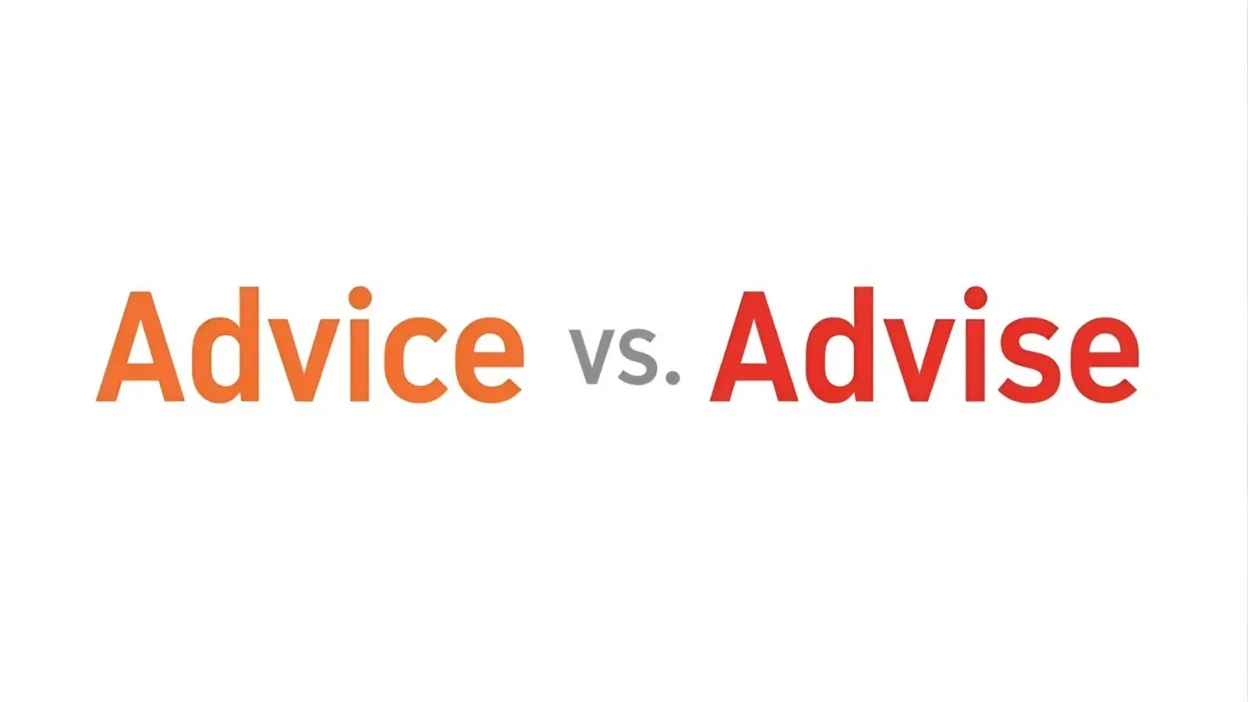Have you ever paused mid-sentence, unsure whether to write advice or advise?
You’re not alone. Many learners—and even native speakers—search for “advice vs advise” because the two words look almost identical but carry different meanings.
This confusion often shows up in professional emails, essays, and social media posts. Using the wrong word can change your sentence entirely and even make it look unprofessional.
The good news? The difference is actually simple once explained clearly. Advice is a noun (a thing you give or receive), while advise is a verb (an action you do).
In this article, we’ll break down the spelling, pronunciation, origins, and usage of advice vs advise.
You’ll also see real examples, common mistakes, Google Trends data, and a handy comparison table to make sure you never mix them up again.
Advice vs Advise – Quick Answer
- Advice = Noun → “I gave her good advice.”
- Advise = Verb → “I advise you to rest.”
👉 Quick trick: If you can replace the word with recommendation, use advice. If you can replace it with suggest, use advise.
The Origin of Advice vs Advise
Both words come from the Latin root videre (“to see”) through Old French. Over time:
- Advice came to mean “what has been seen” → a recommendation or opinion.
- Advise came to mean “to cause someone to see” → guiding or suggesting action.
The spelling difference exists because English borrowed words from both French and Latin, keeping separate forms for noun and verb.
British English vs American English Spelling
Interestingly, advice vs advise does not differ in spelling between British and American English. However, pronunciation differences can confuse learners:
- Advice → /əd-ˈvaɪs/ (ends with “-s” sound)
- Advise → /əd-ˈvaɪz/ (ends with “-z” sound)
Comparison Table:
| Word | Part of Speech | Pronunciation | Example Sentence |
| Advice | Noun | /vaɪs/ | “She gave me good advice.” |
| Advise | Verb | /vaɪz/ | “I advise you to save money.” |
Which Spelling Should You Use?
- If you’re writing for an American audience → use advice (noun) and advise (verb) as explained.
- If you’re writing for a British or Commonwealth audience → the same rule applies.
- If writing globally → stick to standard usage (noun = advice, verb = advise). The distinction is universal.
Common Mistakes with Advice vs Advise
- ❌ She adviced me to wait.
✅ She advised me to wait. - ❌ Can you give me an advise?
✅ Can you give me some advice? - ❌ I need your advises.
✅ Advice is uncountable → I need your advice.
Advice vs Advise in Everyday Examples
- Emails: “I appreciate your advice on the project.” / “I advise you to attend the meeting.”
- News: “Experts give advice during health crises.” / “Doctors advise citizens to stay indoors.”
- Social Media: “Need advice on buying a phone?” / “I advise you to check reviews first.”
- Formal Writing: “The committee offered strategic advice.” / “The lawyer advised his client carefully.”
Advice vs Advise – Google Trends & Usage Data
According to Google Trends:
- Advice is searched more often worldwide than advise.
- The confusion peaks in countries where English is a second language.
- In professional contexts (business, legal, medical), both are used frequently, but advice dominates daily communication.
Comparison Table: Popularity
| Country | More Searched Word | Context |
| USA | Advice | Career, health |
| UK | Advice | Finance, education |
| India | Advise | Business English |
| Pakistan | Advice | Academic writing |
FAQs on Advice vs Advise
Q1. What’s the easiest way to remember advice vs advise?
👉 Advice = noun (thing), Advise = verb (action).
Q2. Can advice be plural?
👉 No. Use “pieces of advice” instead.
Q3. Do British and American English use these words differently?
👉 No, the meaning and spelling are the same in both.
Q4. Is it correct to say “advices”?
👉 No. “Advice” is uncountable.
Q5. How do you pronounce them differently?
👉 Advice ends with an “-s” sound, advise with a “-z” sound.
Q6. Which is more common in writing?
👉 Advice is more common, but both are essential.
Q7. Can advise be used as a noun?
👉 No. Only advice functions as a noun.
Conclusion
The confusion between advice vs advise comes from their similar spelling but different roles in English. Advice is always a noun, meaning recommendations, while advise is always a verb, meaning to give guidance. They share the same root but evolved into distinct functions in English.
For learners, the key is simple: if you’re talking about a thing (recommendation), use advice. If you’re talking about an action (suggesting), use advise. The rule is the same in American, British, and global English.
So next time you’re writing an email, posting on social media, or preparing a formal document, you’ll know exactly which one to use. Correct usage not only improves clarity but also makes your writing look polished and professional.



